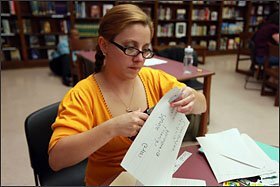The chancellor of the Education Achievement Authority of Michigan plans to improve the state’s lowest-performing schools by dumping traditional teaching methods and giving students a learning plan that will allow them to progress at their own pace.
And the schools won’t use grade levels or letter grades.
It’s an education shake-up that the EAA calls student-centered learning.
The method is performance-based, not time-based: Students are assigned lessons based on their abilities, not their grade level or age. It is supposed to ensure that students are not passed along to graduation with low skills.
A version of the technique has been adopted by at least 29 small districts, organizations, and schools nationwide. Results show that students taught with the method are up to 55 percent more likely to pass state standardized tests, according to experts.
“When you start teaching a child where they are—to address deficiencies—kids are going to be better off,” EAA Chancellor John Covington said. “You master, you move.”
The EAA is the state’s new school reform district, created to take over and improve the lowest-performing 5 percent of Michigan schools. On July 1, the authority took control of its first batch of struggling schools—15 in Detroit.
Differing Versions
Mr. Covington implemented a system similar to the EAA’s student-centered learning in 10 schools in Kansas City, Mo., where he was superintendent before coming to Michigan in 2011. But Kansas City scrapped the teaching method this school year—two years after it started—because of mixed test results, said Andre Riley, a spokesman for the district. He said the new superintendent there wants to take the district in a different direction.

Across the country, versions of the new approach go by a lot of different names—content-based, performance-based, proficiency-based, or personalized learning.
The Michigan authority—with some 10,000 students—is one of the largest school systems in the country to use a version of the new system. For this first year, it is being used in what is traditionally considered kindergarten to 9th grade.
Here’s how it works: Students are placed in classes with other students their age. After two
weeks, they take tests to determine their skill levels. There are 18 levels that cover what are traditionally considered kindergarten-through-8th-grade skills. Ninth graders will be required to master a class before they can progress to the next course. For instance, a freshman who fails Algebra 1 cannot take it in summer school (the EAA has an 11-month calendar), but the student will continue to take Algebra 1-level lessons until he or she proves mastery.
A teacher could have a class where students’ skills range across a few levels. Teachers will be known primarily by which ability levels they teach, not which grade levels.
Students log onto a website to access lessons in the four core subject areas—math, English, science, and social studies—and selected electives. The system assigns students lessons based on their ability levels. That coursework is considered a student’s individual learning plan.The EAA provides a computer for each student to use at school, but students can access their work online from a computer at home or a local library.
Evidence of Proficiency
Students must give evidence—through tests and projects—that they have mastered learning targets in order to progress to the next level.
For example, if a student’s learning target is to show mastery of the concept of symmetry, the teacher will give a lesson, then the student will choose from several practice lessons online. Next, the program will offer a choice of projects to complete to show evidence of mastery.
“You’re not teaching a lesson, you’re teaching a child,” said Mary Esselman, the EAA’s chief officer for accountability, equity, and innovation and the chief administrator who helped Mr. Covington implement the approach in Kansas City.
And parents will see a report card that has no A-F grades. Progress reports will list learning targets and tell whether a student has mastered them.
Jennifer Armstead, a former teacher for the Detroit school system who is now teaching at Nolan Elementary-Middle School, an EAA school in Detroit, is impressed with the new approach.
“It used to be you’d teach the class, give them a work sheet,” she said. “This is more individualized.”
Some of the schools across the country that use the approach also use an online system; othersassign lessons from textbooks and hands-on projects.
The Chugach school district in rural Alaska, with 250 students, is credited with developing a model adopted by 29 schools and districts in the United States.
A 2010 report by the Centennial, Colo.-based Marzano Research Laboratory showed that schools that use the model are 37 percent more likely to score proficient or above on state tests for reading, 54 percent more likely to score proficient or above on state tests for writing, and 55 percent more likely to score proficient or above on state tests for mathematics than schools that did not use the model.
“Usually, with the people we’re working with, by year three is when we start to see some results that are pretty significant,” said Rick Schreiber, a co-founder of the Wasilla, Alaska-based Re-inventing Schools Coalition inspired by the Alaska school.
Angela Underwood, whom Mr. Covington recruited from her job as the principal at Faxon Elementary School in Kansas City, is now principal at the EAA’s Nolan Elementary-Middle School. She said students were more engaged when they knew exactly what was required to progress and were required to show evidence of mastery.
“We saw students move ahead,” she said. “I’m sure we’re going to see the same thing in Detroit that we saw in Kansas City.”




